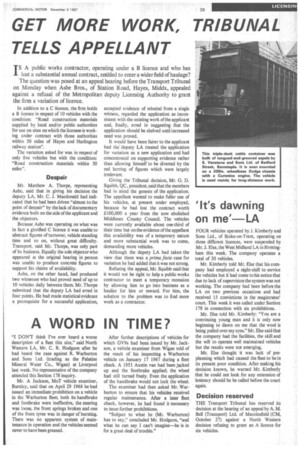GET MORE WORK, TELLS APPELLANT
Page 41

If you've noticed an error in this article please click here to report it so we can fix it.
IS A public works contractor, operating under a B licence and who has lost a substantial annual contract, entitled to enter a wider field of haulage? The question was posed at an appeal hearing before the Transport Tribunal on Monday when Ashe Bros., of Station Road, Hayes, Middx, appealed against a refusal of the Metropolitan deputy Licensing Authority to grant the firm a variation of licence.
In addition to a C licence, the firm holds a B licence in respect of 10 vehicles with the condition: "Road construction materials supplied by local and/or public authorities for use on sites on which the licensee is working under contract with those authorities within 50 miles of Hayes and Harlington railway station".
The variation asked for was in respect of only five vehicles but with the condition: "Road construction materials within 50 miles".
Despair
Mr. Matthew A. Thorpe, representing Ashe, said that in giving his decision the deputy LA, Mr. C. J. Macdonald had indicated that he had been driven "almost to the point of despair" by the lack of documentary evidence both on the side of the applicant and the objectors.
Because Ashe was operating on what was in fact a glorified C licence it was unable to abstract figures of turnover, vehicle standing time and so on, without great difficulty. Transport, said Mr. Thorpe, was only part of its business. Equally the sole objector who appeared at the original hearing in person was unable to produce concrete figures to support his claims of availability.
Ashe, on the other hand, had produced two witnesses who had proved need of up to 10 vehicles daily between them. Mr. Thorpe submitted that the deputy LA had erred in four points. He had made statistical evidence a prerequisite for a successful application, accepted evidence of rebuttal from a single witness, regarded the application as inconsistent with the existing work of the applicant and, finally, erred in suggesting that the application should be shelved until increased need was proved.
It would have been fairer to the applicant had the' deputy LA treated the application for variation as a new application and had concentrated on supporting evidence rather than allowing himself to be diverted by the red herring of figures which were largely irrelevant.
Giving the Tribunal decision, Mr. G. D. Squibb, QC, president, said that the members had in mind the genesis of the application. The appellant wanted to make fuller use of his vehicles, at present under employed, because he had lost the contract worth £100,000 a year from the now abolished Middlesex County Council. The vehicles were currently available about one-third of their time but on the evidence of the appellant this availability was of a temporary nature and more substantial work was to come, demanding more vehicles.
Although the deputy LA had taken the view that there was a prima facie case for variation he had added that it was not strong.
Refusing the appeal, Mr. Squibb said that it would not be right to help a public works contractor to meet a temporary recession by allowing him to go into business as a haulier for hire or reward. For him, the solution to the problem was to find more work as a contractor.








































































































































